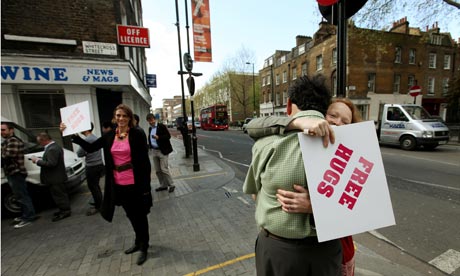
As drivers angrily beeped their horns and cyclists weaved impatiently through London's traffic, Amandeep Hothi stood cheerily on the pavement holding aloft a sign offering, in pink letters, "Free Hugs".
Hothi is part of a new group called Action for Happiness, whose members aim to boost the net amount of joy in the world by being kind to others and countering "an epidemic of loneliness and isolation".
The movement was launched yesterday at Jerwood Hall in the City of London, where the movement's co-founder told attendees – who wore badges with slogans such as "Love more!" and "I'm up for more happiness!" – that they could "turn the rising tide of excessive individualism".
"Despite the fact that we are getting richer, after 60 years we still haven't managed to produce a happier society," said Professor Richard Layard, head of the wellbeing programme at the London School of Economics. "We are asking people for an individual commitment to aim to produce more happiness and less misery.
"The time is right. There is a worldwide hunger for something better, and we believe we can harness it," he added.
The movement's supporters say it is not just about fluffy slogans or interfering do-gooders. Founded last year, it requires members, who can sign up via a website, to set up action groups to promote happiness wherever possible: at work, at home or in the community.
There is evidence that the happiness movement is being taken seriously in high places. As deep public-sector cuts loomed, David Cameron told a conference last year that it was time "we admitted that there's more to life than money," adding: "It's time we focused not just on GDP but on GWB – general wellbeing."
In November, the government asked the Office of National Statistics to produce measures to gauge "general wellbeing". France's president, Nicolas Sarkozy, has declared his intention to include happiness and wellbeing in France's measurement of economic progress, while Canadian statisticians also poll subjective wellbeing across the country.
The launch, hosted by TV presenter Sian Williams, was followed by a group meditation only briefly disturbed by a determined ringtone. Action for Happiness's director, Mark Williamson, rallied the troops. Britain was in an "epidemic of loneliness and isolation" but research showed helping others, as well as having a positive effect on your own wellbeing, could have a far-reaching impact, he said.
"The contagious nature of happiness means that we affect not only our friends, but our friends' friends. It spreads to form an extremely powerful social network."
The Action for Happiness website yesterday collapsed under the weight of users, declaring itself overwhelmed – a reminder, perhaps, that the search for contentment is sometimes beyond our control.

